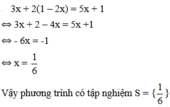

Hãy nhập câu hỏi của bạn vào đây, nếu là tài khoản VIP, bạn sẽ được ưu tiên trả lời.



\(a,2x\left(x-5\right)+4\left(x-5\right)=0\\ \Leftrightarrow\left(x-5\right)\left(2x+4\right)=0\\ \Leftrightarrow\left[{}\begin{matrix}x-5=0\\2x+4=0\end{matrix}\right.\\ \Leftrightarrow\left[{}\begin{matrix}x=5\\2x=-4\end{matrix}\right.\\ \Leftrightarrow\left[{}\begin{matrix}x=5\\x=-2\end{matrix}\right.\)
Vậy \(x\in\left\{5;-2\right\}\)
\(b,3x-15=2x\left(x-5\right)\\ \Leftrightarrow3\left(x-5\right)-2x\left(x-5\right)=0\\ \Leftrightarrow\left(x-5\right)\left(-2x+3\right)=0\\ \Leftrightarrow\left[{}\begin{matrix}x-5=0\\-2x+3=0\end{matrix}\right.\\ \Leftrightarrow\left[{}\begin{matrix}x=5\\2x=3\end{matrix}\right.\\ \Leftrightarrow\left[{}\begin{matrix}x=5\\x=\dfrac{3}{2}\end{matrix}\right.\)
Vậy \(x\in\left\{5;\dfrac{3}{2}\right\}\)
\(c,\left(2x+1\right)\left(3x-2\right)=\left(5x-8\right)\left(2x+1\right)\\ \Leftrightarrow\left(2x+1\right)\left(3x-2\right)-\left(5x-8\right)\left(2x+1\right)=0\\ \Leftrightarrow\left(2x+1\right)\left(3x-2-5x+8\right)=0\\ \Leftrightarrow\left(2x+1\right)\left(-2x+6\right)=0\\ \Leftrightarrow\left[{}\begin{matrix}2x+1=0\\-2x+6=0\end{matrix}\right.\\ \Leftrightarrow\left[{}\begin{matrix}2x=-1\\2x=6\end{matrix}\right.\\ \Leftrightarrow\left[{}\begin{matrix}x=-\dfrac{1}{2}\\x=3\end{matrix}\right.\)
Vậy \(x\in\left\{-\dfrac{1}{2};3\right\}\)
Câu d xem lại đề

a) \(3\left(x-1\right)=5x+8\)
\(\Leftrightarrow\)\(3x-3=5x+8\)
\(\Leftrightarrow\)\(2x=-11\)
\(\Leftrightarrow\)\(x=-5,5\)
Vậy...
b) \(9x^2-1=\left(3x+1\right)\left(4x+1\right)\)
\(\Leftrightarrow\)\(\left(3x-1\right)\left(3x+1\right)-\left(3x+1\right)\left(4x+1\right)=0\)
\(\Leftrightarrow\)\(\left(3x+1\right)\left(3x-1-4x-1\right)=0\)
\(\Leftrightarrow\)\(\left(3x+1\right)\left(-x-2\right)=0\)
\(\Leftrightarrow\)\(\orbr{\begin{cases}3x+1=0\\-x-2=0\end{cases}}\)\(\Leftrightarrow\)\(\orbr{\begin{cases}x=-\frac{1}{3}\\x=-2\end{cases}}\)
Vậy..
c) \(\left(2x+1\right)^2=\left(x-1\right)^2\)
\(\Leftrightarrow\)\(\left(2x+1\right)^2-\left(x-1\right)^2=0\)
\(\Leftrightarrow\)\(\left(2x+1-x+1\right)\left(2x+1+x-1\right)=0\)
\(\Leftrightarrow\)\(3x\left(x+2\right)=0\)
\(\Leftrightarrow\)\(\orbr{\begin{cases}x=0\\x+2=0\end{cases}}\)\(\Leftrightarrow\)\(\orbr{\begin{cases}x=0\\x=-2\end{cases}}\)
Vậy...
d) \(2x^3+3x^3-5x=0\)
\(\Leftrightarrow\)\(5x^3-5x=0\)
\(\Leftrightarrow\)\(5x\left(x-1\right)\left(x+1\right)=0\)
\(\Leftrightarrow\)\(x=0\)hoặc \(x-1=0\)hoặc \(x+1=0\)
\(\Leftrightarrow\)\(x=0\) hoặc \(x=1\) hoặc \(x=-1\)
Vậy...
p/s: chỗ "hoặc" bn đưa về kí hiệu "[" cho mk nhé
e) \(x^2+2x-15=0\)
\(\Leftrightarrow\)\(\left(x-3\right)\left(x+5\right)=0\)
\(\Leftrightarrow\)\(\orbr{\begin{cases}x-3=0\\x+5=0\end{cases}}\)
\(\Leftrightarrow\)\(\orbr{\begin{cases}x=3\\x=-5\end{cases}}\)
Vậy...

Câu 1:
a) Ta có: 7x+21=0
\(\Leftrightarrow7x=-21\)
hay x=-3
Vậy: S={-3}
b) Ta có: 3x-2=2x-3
\(\Leftrightarrow3x-2-2x+3=0\)
\(\Leftrightarrow x+1=0\)
hay x=-1
Vậy: S={-1}
c) Ta có: 5x-2x-24=0
\(\Leftrightarrow3x=24\)
hay x=8
Vậy: S={8}
Câu 2:
a) Ta có: \(\left(2x+1\right)\left(x-1\right)=0\)
\(\Leftrightarrow\left[{}\begin{matrix}2x+1=0\\x-1=0\end{matrix}\right.\Leftrightarrow\left[{}\begin{matrix}2x=-1\\x=1\end{matrix}\right.\Leftrightarrow\left[{}\begin{matrix}x=-\dfrac{1}{2}\\x=1\end{matrix}\right.\)
Vậy: \(S=\left\{-\dfrac{1}{2};1\right\}\)
b) Ta có: \(\left(2x-3\right)\left(-x+7\right)=0\)
\(\Leftrightarrow\left[{}\begin{matrix}2x-3=0\\-x+7=0\end{matrix}\right.\Leftrightarrow\left[{}\begin{matrix}2x=3\\-x=-7\end{matrix}\right.\Leftrightarrow\left[{}\begin{matrix}x=\dfrac{3}{2}\\x=7\end{matrix}\right.\)
Vậy: \(S=\left\{\dfrac{3}{2};7\right\}\)
c) Ta có: \(\left(x+3\right)^3-9\left(x+3\right)=0\)
\(\Leftrightarrow\left(x+3\right)\left[\left(x+3\right)^2-9\right]=0\)
\(\Leftrightarrow\left(x+3\right)\left(x+3-3\right)\left(x+3+3\right)=0\)
\(\Leftrightarrow x\left(x+3\right)\left(x+6\right)=0\)
\(\Leftrightarrow\left[{}\begin{matrix}x=0\\x+3=0\\x+6=0\end{matrix}\right.\Leftrightarrow\left[{}\begin{matrix}x=0\\x=-3\\x=-6\end{matrix}\right.\)
Vậy: S={0;-3;-6}

Cách giải
a, 2x - x (3x + 1 ) < 15 - 3x(x + 2)
<=> 2x - 3x2 - x < 15 - 3x2 - 6x
<=> 7x < 15
<=> x < 15/7 Vậy Tập nghiệm của BPT là : { x / x < 15/7 }
b , BPT <=> 2(1 - 2x ) - 16 < 1 - 5x + 8x
<=> -7x < 15
<=> x > -15/7 Vậy tập nghiệm của BPT là : { x / x > -15/7 }
a) 2x-x(3x+1) < 15-3x(x+2)
<=> 2x-3x2-x < 15-3x2-6x
<=> 2x-3x2-x+3x2+6x < 15
<=> 7x < 15
<=> x < 15/7
Vậy tập nghiệm của bất phương trình là x < 15/7
b) \(\frac{1-2x}{4}-2\le\frac{1-5x}{8}+x\)
Quy đồng mẫu ta được :
\(\frac{2-4x}{8}-\frac{16}{8}\le\frac{1-5x}{8}+\frac{8x}{8}\)
Khử mẫu
=> \(2-4x-16\le1-5x+8x\)
<=> \(-4x+5x-8x\le1-2+16\)
<=> \(-7x\le15\)
<=> \(x\ge-\frac{15}{7}\)
Vậy tập nghiệm của bất phương trình là \(x\ge-\frac{15}{7}\)

\(a,6x^2-5x+3=2x-3x\left(3-2x\right)\)
\(\Leftrightarrow6x^2-5x+3=2x-9x+6x^2\)
\(\Leftrightarrow6x^2-6x^2-5x-2x+9x=-3\)
\(\Leftrightarrow2x=-3\)
\(\Leftrightarrow x=-\dfrac{3}{2}\)
\(b,\left(3x-1\right)\left(4x+3\right)=2\left(3x-1\right)\)
\(\Leftrightarrow\left(3x-1\right)\left(4x+3\right)-2\left(3x-1\right)=0\)
\(\Leftrightarrow\left(3x-1\right)\left(4x+3-2\right)=0\)
\(\Leftrightarrow\left[{}\begin{matrix}3x-1=0\\4x+1=0\end{matrix}\right.\)
\(\Leftrightarrow\left[{}\begin{matrix}x=\dfrac{1}{3}\\x=-\dfrac{1}{4}\end{matrix}\right.\)
\(6x^2-5x+3=2x-3x\left(3-2x\right)\)
\(\Leftrightarrow6x^2-5x+3=2x-9x+6x^2\)
\(\Leftrightarrow6x^2-5x+3-2x+9x-6x^2=0\)
\(\Leftrightarrow2x+3=0\)
\(\Leftrightarrow2x=-3\)
\(\Leftrightarrow x=\dfrac{-3}{2}\)
\(\text{Vậy phương trình có tập nghiệm là }S=\left\{\dfrac{-3}{2}\right\}\)
\(\left(3x-1\right)\left(4x+3\right)=2\left(3x-1\right)\)
\(\Leftrightarrow\left(3x-1\right)\left(4x+3\right)-2\left(3x-1\right)=0\)
\(\Leftrightarrow\left(3x-1\right)\left(4x+3-2\right)=0\)
\(\Leftrightarrow\left(3x-1\right)\left(4x-1\right)=0\)
\(\Leftrightarrow\left[{}\begin{matrix}3x-1=0\\4x-1=0\end{matrix}\right.\Leftrightarrow\left[{}\begin{matrix}3x=1\\4x=1\end{matrix}\right.\Leftrightarrow\left[{}\begin{matrix}x=\dfrac{1}{3}\\x=\dfrac{1}{4}\end{matrix}\right.\)
\(\text{Vậy phương trình có tập nghiệm là }S=\left\{\dfrac{1}{3};\dfrac{1}{4}\right\}\)

(2x + 1)(3x – 2) = (5x – 8)(2x + 1)
⇔ (2x + 1)(3x – 2) – (5x – 8)(2x + 1) = 0
⇔ (2x + 1).[(3x – 2) – (5x – 8)] = 0
⇔ (2x + 1).(3x – 2 – 5x + 8) = 0
⇔ (2x + 1)(6 – 2x) = 0
⇔ 2x + 1 = 0 hoặc 6 – 2x = 0
+ 2x + 1 = 0 ⇔ 2x = -1 ⇔ x = -1/2.
+ 6 – 2x = 0 ⇔ 6 = 2x ⇔ x = 3.
Vậy phương trình có tập nghiệm 
